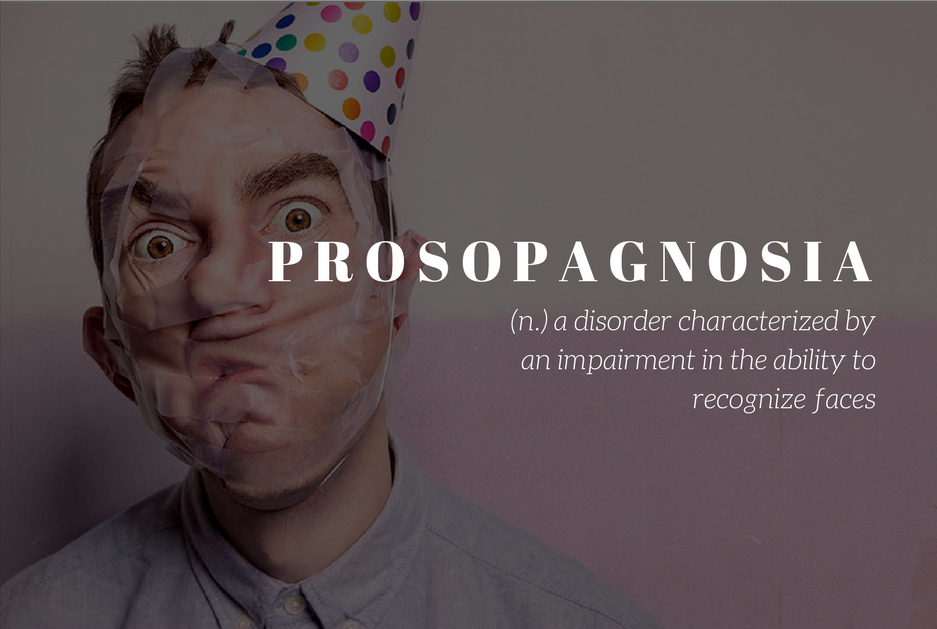4 Scientific Reasons You Forget Names & 7 Tricks to Remember Names

Let’s be real, we all struggle to remember names sometimes. We’ve all forgotten a name or two (or three) during our lifetimes. It may have been awkward, or you may have been able to play it cool. In any case, have you ever wondered why it is so difficult to remember names? This study by Griffin, even suggests that names are among some of the most difficult words to remember. How can something apparently simple be the cause of thousands if not millions of awkward moments?
-
Prosopagnosia?
There is a condition called ‘prosopagnosia’ (face blindness) a disorder characterized by an impairment in the ability to recognize faces – in some cases even your own face. If you have that, it seems fair that you would also struggling to remember names – or matching the right face with the right names. But as prosopagnosia probably affects less 2.5% of the US population (Grüter, 2008) it is quite unlikely that that would be the only reason so many people struggle to remember names. There are many other reasons actually, which all interact to make it difficult to remember names.

-
Meaningless, or not?
Another common theory on why we struggle to remember names is that names are more or less meaningless in daily life. (source) If you dig around pretty much any name will have a etymological meaning. For example, Edward comes from Old English ead “wealth, fortune” and weard which means “guard”. So Edward means or used to mean “rich guard”, but we do not use it in daily life to mean “rich guard”. In fact, most of the people reading this will probably not have been aware of this meaning. To 99.99% of people who know the name Edward is just a name, and they only use it as a name. This lack of meaning might be an important reason why we struggle to remember names. Of course, names like “Chastity” or “Destiny” might be an exception to that, as those are still used as words. These also lead to think that names like that might possibly be easier to remember, what do you think?
Because names hold little other information besides being a name, it’s theorized that our brain just struggles to remember random (as in ‘meaningless’). It’s a little bit like a random sequence of keyboard symbols.

-
Are you interested?
One study suggests it might not be how good your memory is, but whether you are paying attention or not. Psychologist Richard Harris’ research has found that interest level correlates with how well we remember names. It could be that you are not paying enough attention, or that your focus is with something else at the moment. Something that always seems to throw us off is that we are thinking about what we are going to say. We think about how we will introduce ourselves or what topics to bring up during later conversation. So in a way this does not necessarily denote that you do not care, but maybe that you care so much about what is happening, that your focus is with something other than names.
People who are interested in meeting others tend to be better at remembering names, as there is a different level of interest there.
You might also like: What is your best personality trait? QUIZ
-
No connections

If the brain cannot make any connections to other things such as shapes, symbols or information, it struggles to store the information away. (source) Combine this with the ‘next-in-line’ effect and you have a recipe for memory loss. The next-in-line effect discusses how we are likely to forget things that happen a few moments before it’s our own turn to do something, or just after it was our turn to do something. It’s because in that moment we are either anticipating or subconsciously reviewing our own turn that we do not focus as much on what others are doing. (source) Going back to the subject of names; we are expecting to introduce ourselves the next moment, or have just introduced ourselves when we hear the new name. This is the moment that we are especially prone to not properly take in new information. As a result we are slightly more likely to forget names in that moment. However, that can be remedied by being aware of this “weak point” and being extra careful to notice the name.
Those are some of the scientific explanations as to why we struggle to remember names. Now we know why, we can also give some tips on how to better remember names from now on.
-
Motivation will drive your memory
Try to make yourself want to remember. If you can motivate yourself, in any way, to want to remember it; whether it’s preventing awkwardness later or increasing your own interest at meeting new people. Just reading this article and being aware of the weak moments in time when you are more likely to forget things will hopefully already help you next time you need to remember something. Imagine there’s a reward for you when you remember it. Of course you will be remembering that name.

-
R-e-p-e-a-t them and you will remember names
Take your time. Take a little moment just to focus on the name when you hear it. Do not immediately start speaking, but repeat the name in your head once or twice. This small act will possibly make a big difference. This is because repetition is key to getting information from your short term memory and working memory into your long term memory. (source) If you can make this little moment a habit, it will help you for years to come. Better still, just repeat it back to the person, respond with “Nice to meet you [name]”. Trust us, repeating the name will possibly save a lot of awkwardness later.

-
Make a special effort to link it to something else
Connections are what our memory and brain builds on, from physical neural connections to ‘just’ information that can be linked in any way. For example, if you meet someone named Angela you might think of someone you know called Angela. Or perhaps this Angela is wearing a shirt of which the design or print related to a band you’ve heard of. Who knows, Angela might just have a really cool hairdo you’ve seen on someone else some time. Or you might think the sound of the name reminds you of Angelina Jolie, or what might be remarkable is that this Angela has nothing in common with Angelina Jolie. If you meet someone named Jeff you might think the name sounds like chef, and picture him in a chef’s uniform. It can be as ‘odd’ or far-fetched as you want to; it’s not like you have to tell anyone else. The point is just that linking the name to anything else you know will strengthen the memory. Anything about them or their name that stands out that you can link is good.
-
Use mnemonics (memory shortcuts) to remember names

Especially for names you find more difficult this is really important. And it might also be a good idea to ask a person who’s name is more tricky for you to spell their name (be sensitive about it though). Be careful to not come across as haughty but emphasize that you just want to be sure you are pronouncing it correctly. Let’s say someone’s name is Habsburg (sometimes spelled Hapsburg). (source) You could break it up into different sets of syllables (Habs- which sounds a little bit like “hop” and – burg) and come up with someone hopping while holding a burger. The more weirder the better.
-
Use it at least once in the conversation
Be creative but not awkward about working it in. Perhaps if you’ve been talking a little bit about one subject and you are about to ask them about something else you could phrase it like this. “So [name] what are some of your hobbies then?” or “So [name] what do you think about [other subject]? This will work because – as we mentioned – repeating it helps your working memory.
-
Following that…
You can combine that with previous techniques. Link their name to something you learned about them. “Emma has 2 dogs and would like to travel to France some day.” “Jeff likes cycling and writes blogs about books.”

-
Use their name when saying goodbye

A simple “Goodbye, Shanti” or “I’ll speak to you later Ibrahim” will work wonders, both in the impression you leave behind and your own ability to remember it. Again, repetition is the key to remember names.
Last resort tips to find out a name if you’ve forgotten (again)
Please note that this does not work in every social situation.
- Ask the person how you should spell their name.
- If it was an ‘easy’ to spell name it might be awkward, but try to save it by saying something like “No, sorry I meant your surname.” If it was indeed a difficult name, you’re good now, unless you mess up the pronunciation. You could also ask the person what their name means (etymologically), and if they don’t know offer to help them look it up because you are interested in name-meanings. (?)
- If their surname was ‘easy’ to spell as well, you could say that you knew/know someone who has the same name but spells it differently, and that it you were curious if the name of the person you are currently talking to was spelled the same way. Play it as cool as you can.
So these were reasons we struggle to remember names. Hopefully the tips we gathered will be useful to you in the future! What was the most awkward moment you’ve ever forgotten a name?
You might also like: What is your best personality trait? QUIZ
How high is your Spatial Intelligence? QUIZ
Sources
Grüter T., Grüter M., Carbon C. C. (2008). “Neural and genetic foundations of face recognition and prosopagnosia.” Journal of Neuropsychology. 2(1): 79-97.
CNBC memory hacks to remember names
Business Insider remembering names
Daily Mail why your brain struggles to remember names
Evening Standard why is it so difficult to remember names



Really interesting article. I struggle really hard sometime with and it’s like you said, it’s like i don’t care about people but i am really into my thoughts on what to say. Thank you so much for the information 😀
Great information! I would just add that forgetting names may in some cases be a preliminary sign of dementia, so it’s worth talking with the doctor for an assessment. Some of the other symptoms to watch for are outlined in this article: http://allcarelivingservices.com/recognizing-the-symptoms-of-dementia/